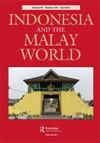殖民地线人与亚齐-荷兰战争
IF 0.9
3区 社会学
0 ASIAN STUDIES
引用次数: 1
摘要
本文讨论了在亚齐-荷兰战争(1873-c.1912)期间,殖民地告密者在回应Teuku Umar与荷兰当局的合作方面的贡献。本研究的对象是库塔拉贾(Kutaraja)的首席Penghulu (1893-1895) Haji Hasan Mustapa给他的殖民地朋友C. Snouck Hurgronje的信件合集。这些信件保存在莱顿大学图书馆。或,18.097)。在关于亚齐-荷兰战争的研究中,Hasan Mustapa的名字很少被提及。他不断地向当时住在巴达维亚的斯努克·赫尔格隆杰提供有关战争的信息。这项研究证实,Hasan Mustapa的立场对于获得Teuku Umar与荷兰当局合作的信息具有重要意义。Hasan Mustapa从亚齐线人和荷兰官员那里获得了信息,他认为Teuku Umar不可信。Hasan Mustapa关于Teuku Umar的信息对于Snouck Hurgronje向东印度群岛的荷兰当局提出建议非常重要。因此,这是一项关于东印度群岛殖民时期举报人与其赞助人的密切关系的研究。本文章由计算机程序翻译,如有差异,请以英文原文为准。
Colonial informants and the Acehnese-Dutch war
ABSTRACT This article discusses the contribution of colonial informants during the Acehnese-Dutch war (1873–c.1912) in responding to Teuku Umar’s collaboration with the Dutch authorities. The object of this study is a collection of letters from the Chief Penghulu of Kutaraja (1893–1895), Haji Hasan Mustapa, to his colonial friend, C. Snouck Hurgronje. These letters are held at the Leiden University Library (Cod. Or. 18.097). Hasan Mustapa’s name is rarely mentioned in studies of the Acehnese-Dutch war. He constantly provided information relating to the war to Snouck Hurgronje who was living in Batavia at the time. This study confirms that Hasan Mustapa’s position was significant in gaining information about Teuku Umar’s collaboration with the Dutch authorities. Hasan Mustapa acquired information from both Acehnese informants and Dutch officials, and believed that Teuku Umar could not be trusted. Hasan Mustapa’s information on Teuku Umar was important for Snouck Hurgronje’s advice to the Dutch authorities in the East Indies. This is therefore a study on the closeness of informants and their patrons during colonial times in the East Indies archipelago.
求助全文
通过发布文献求助,成功后即可免费获取论文全文。
去求助
来源期刊

Indonesia and the Malay World
ASIAN STUDIES-
CiteScore
2.00
自引率
0.00%
发文量
17
期刊介绍:
Indonesia and the Malay World is a peer-reviewed journal that is committed to the publication of scholarship in the arts and humanities on maritime Southeast Asia. It particularly focuses on the study of the languages, literatures, art, archaeology, history, religion, anthropology, performing arts, cinema and tourism of the region. In addition to welcoming individual articles, it also publishes special issues focusing on a particular theme or region. The journal is published three times a year, in March, July, and November.
 求助内容:
求助内容: 应助结果提醒方式:
应助结果提醒方式:


